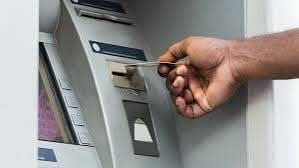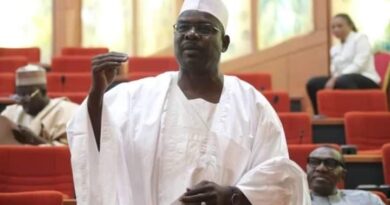Naira Cash scarcity hits harder this Christmas season as banks shun CBN sanction threats
Days after the Central Bank of Nigeria ordered Deposit Money Banks to guard against artificial cash scarcity in the country, findings have revealed that the trend still persists in some parts of the country.
In a circular dated November 29, jointly signed by Acting Directors Solaja Olayemi (Currency Operations) and Isa-Olatinwo Aisha (Branch Operations), the CBN outlined measures aimed at improving cash availability, reports Sunday PUNCH.
According to the circular, the CBN directed banks to ensure efficient cash disbursement through both Automated Teller Machines and over-the-counter channels, warning of penalties for non-compliance.
The apex bank also urged customers experiencing challenges to report incidents with details such as account name, bank name, transaction amount, and date. Dedicated phone numbers and email addresses were released for Nigerians to report difficulties accessing cash.
However, as of Friday, Nigerians in some major cities told our correspondents that they still experienced significant difficulty obtaining sufficient cash over the counters and at ATMs in some commercial banks.
An Abuja resident, who declined to be named, said his bank only dispensed N5,000 over the counter on Friday.
When asked whether this was a bank-wide directive, she stated that it might be due to the limited cash available, adding that customers were often advised to use ATMs.
He said, “As of Friday, it was just N5,000. But if the ATM is loaded, you can withdraw as much as it dispenses. That’s probably all the bank could afford on Friday. Most times, customers are advised to use the ATM, which dispenses fresh mints.”
Similarly, a United Bank for Africa customer in Abuja said his bank dispensed N20,000 over the counter, while ATMs dispensed N20,000 to customers and N10,000 to customers of other banks as of Friday.
A Zenith Bank official in Delta State revealed that their branch paid a maximum of N20,000 to customers, both over the counter and through ATMs.
“It’s N20,000 maximum. The ATM also dispenses N20,000,” she stated.
A Lagos resident, Tunde Ajiboye, shared on Facebook that he withdrew N20,000 from a GTBank ATM in Ikorodu and later withdrew another N30,000 over the counter at Lotus Bank, also in Ikorodu, on Friday afternoon.
In Akure, Ondo State, the cash crunch was also pronounced. A resident, Oluwaseyi Oluwalade, said he visited an ATM terminal in Akure but couldn’t withdraw any cash.
“I rushed to a PoS operator, but I still didn’t get cash. I was asked to make a transfer, which I did on Friday, but I could only collect the cash on Saturday afternoon,” he lamented.
Another Akure resident, Adeniyi Samuel, who works for OPay, confirmed complaints from PoS operators about insufficient cash in banks.
“Many of our operators rely on filling station attendants or BDC operators to get cash because banks give very little over the counter or at ATMs,” he explained.
In Imo State, residents also decried withdrawal limits.
A resident, who asked to be identified only as Onyekachi, said, “We cannot withdraw more than N20,000 in the banking hall. You spend so much time, only to be given a maximum of N20,000. It’s frustrating.”
A similar scenario unfolded in Abia State, where banks limited withdrawals to between N5,000 and N20,000. ATMs dispensed as little as N5,000 to non-customers and N10,000 to customers.
In Kwara, residents also struggled to access cash.
Ibrahim Taiwo, a resident of Ilorin, said banks paid a maximum of N10,000 over the counter and N40,000 at ATMs. He noted that PoS operators increased their charges by N50 across withdrawal amounts.
In Osun and Oyo states, withdrawal limits varied between N10,000 and N50,000, depending on the bank and location.
Reacting to the situation, a source at the CBN accused some banks of favouring high-end customers by giving them bulk cash at the expense of ordinary Nigerians. The source assured that the CBN was committed to penalising erring banks.
However, a banker in Ogun State accused the CBN of being insincere, claiming, “The amount given to us is not enough to load ATMs for two days.”
A Polaris Bank staff member in Lagos linked the scarcity to the naira redesign policy under former CBN Governor Godwin Emefiele. He noted that the policy destroyed old naira notes but failed to replace them with adequate new notes, leading to persistent scarcity.
“People are skeptical about depositing money in banks, fearing a repeat of last year’s issues. This is affecting the availability of cash,” he concluded.
The National President of Association of Mobile Money and Bank Agents in Nigeria, Fasasi Atanda, accused petrol stations, supermarket operators, traders, and other businesses that handle large volumes of cash daily of contributing to the current cash scarcity.
Atanda alleged that instead of depositing their cash earnings into banks as expected, those entities hoard the money and sell it at inflated rates to cash dealers.
“There is no reason for cash scarcity if there are no saboteurs. There is cash commoditisation. Today, we have saboteurs who are dealing in the sale of cash. They sell cash in bulk; they have their sources, and they buy in bulk and sell. What you can’t get in the banks, you will get from cash dealers.
“We are aware of petrol stations, restaurants, supermarket operators, and others selling their cash instead of depositing it in banks.
“People often wrongly accuse agents of selling cash. Agents are not selling cash, we are servicing the people and the charges are for the cost of data and transportation. In reality, if the government can take care of these costs, agents can render their services free of charge,” Atanda said.
He urged the CBN to engage PoS operators as official agents of cash distribution, adding that this would address the challenge of cash scarcity in the country.
The acting Director of Corporate Communications for the CBN, Mrs. Hakama Sidi Ali, did not respond to calls and a text message sent to her phone as of press time.




